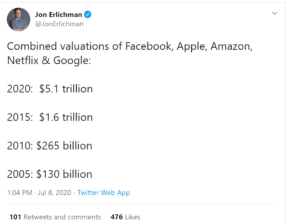
(Rawpixel.com/Shutterstock)
Now here’s a crazy idea: What if the data we all generate on a day to day basis benefited us, instead of the companies that collect it? It may sound nuts at first, but some AI experts see a future in which people hold full control over their data and smart digital assistants infused with AI work to protect and monetize a person’s individual’s data for his or her benefit.
This vision of a more equitable big data world is one that’s held by Sri Ambati. The H2O.ai founder and CEO sees a day not too far in the future in which people are empowered to control their own data as an asset, and even to profit directly from their data, which is something that only a handful of individuals are currently able to do.
“Today, whether we want it or not, our data is stored on giant social networks,” Ambati tells Datanami. “Our clicks are essentially stolen away and leave a fingerprint of who we are digitally. In that sense, we don’t have ownership. We’ve just kind of given carte blanche ownership to the companies with the largest Internet presence, if you will.”
The FAANG companies (Facebook, Amazon, Apple, Netflix, Google) have the biggest and most sophisticated data collection and AI systems ever built. As the big data wave has grown over the past decade, so have the FAANG company’s fortunes. In fact, their collective valuations have skyrocketed by nearly 20x over the past 10 years to more than $5 trillion.
But with a few changes in how people approach data, those data-driven benefits can begin accruing to the individual data owners instead of the tech giants.
Smart Digital Assistant
In Ambati’s vision, each individual will have a kind of digital assistant that can help make the best use of his or her data. These trusted digital assistants–think of an accountant fused with a stock broker mixed with a password management and identity protection–would use AI to play the role of “chief digital officer” for the individual’s existence, both online and in the physical world.
“In the same way that every company has a legal partner, every company has a trading partner, every company has a financial ecosystem – [we could] bring it down all the way to the individual,” Ambati says. It would be “a vault for your data, an investment partner for you to use your data effectively and get the most value for who you are.”
The primary directive of these digital assistants would be to protect the individual’s data. While physical assets can be replaced in this world, losing one’s data is “not a recoverable act. It’s not a reversable situation,” Ambati says. “And so it makes more sense to protect your data as if it were valuable, because it is valuable. It’s valuable not just to you, but to the world.”
The digital assistant’s first step would be to track down all the places where an individual’s data is being collected or used on the Internet. “That’s the beginning–tracking down and making sure we can get a bill of materials for all the assets that one has left on the Internet, just like we have ways to track down asset in the physical world,” he says.
A Marketplace for Data
Once the data is secured, the digital assistant would help individuals monetize that data on the open market. This could involve selling data to the highest bidder, or giving it away, if they so choose.
“It leads to an ecosystem of service providers who are going to basically provide good guidance as well as APIs on how to monetize the digital assets,” Ambati says. “I think the whole concept of commodity trading will need to happen for data. That whole exchange and marketplace is missing.”
Individuals will also gain the ability to barter with their data, and demand services in exchange for their data. There is some of that going on today, but individuals are typically not aware that it’s happening, unless they take the time to read the End User License Agreement (EULA) that accompanies most online services.
“Today you need an e-store, and there is no leverage. It’s not owned by anyone, other than the who created it,” Ambati says. “But once that leverage shifts a little, you get a free months cell phone bill, for example, for having them use a portion of the data. But today there is no such thing.”
Blockchain technologies could be employed to ensure the sanctity of individuals’ data and the security of transactions. Cybercriminals would be attracted to this new paradigm, of course, but Ambati says maintaining openness would allow marketplaces with the best track records on security to succeed.
“The exchanges with the most security are the ones you’re going to use and trade on,” he says. “The ones with the most liquidity are the ones you’re going to trade on.”
A Personal Data Gold Mine
Having all of one’s data readily available for analysis could also yield some interesting insights that today are primarily being leveraged by corporations with the goal of selling more stuff or getting people to look at ads.
For example, the digital assistant could recommend the best time to drive to the grocery store based on traffic patterns. One’s patterns of consumption–including what food one eats, what music one listens to, and what books one reads—could be analyzed and recommendations generated on behalf of the individual, not the corporation. Digital assistants could negotiate on one’s behalf, getting better rates on car insurance, or better communication bundles.
“Lots of these data sets are now locked in different corporations,” Ambati says. “Eventually the integration of all of that information for our own personal usage, and ability to deploy that data over a group of communities–all those pieces are value added services that will lead to creating that economy.”
Today’s smartphones have more storage capacity and processing power than the most powerful supercomputers did 30 years ago. If we can leverage the phones to collect and analyze the data exhaust generated by individuals, we have the ability to create rich models that describe, inform, and predict elements of our lives at a whole new level.
“There are billions of these devices that truly democratizes the ability to both save, but beyond that, to mine and use it for your own benefit,” Ambati says. “Data is a capture of our experience and the ability to share experiences and tell stories–that’s a very human endeavor. And I think if you can start building the right toolsets that are at the fingers of every smartphone owner, they should be able to use that toolset and start building a small but significant growing economy of data owners.”
This vision of beneficial ownership of data is already a reality, but only for a small handful of individuals, Ambati says. “It already happens for the top influencers on some social networks. We just have to democratize that for everyone,” he says. “The system should start working on your behalf.”
A Change for the Better
So what needs to happen for this vision to become reality? Why would the FAANG companies (plus Microsoft) willingly give up control of this rich natural resource (data) when it has been so good to them?
According to Ambati, people will naturally gravitate to this new mode once macro economic-social conditions make them more favorable.
“The alternatives haven’t been created. That’s kind of the reason why they’re not fighting the big companies today,” he says. “They [the FAANG companies] were startups 20 year ago…so the way capitalism works, it’s going to naturally make this transition happen [eventually].”
TikTok presents an interesting example. While the social media property may not be the best example of a company that’s responsibly collecting data (it’s been accused of funneling private data to the Chinese government), it is a compelling example of a company that come out of nowhere to disrupt established giants. This phenomenon will continue.
New data regulations will help, according to Ambati, who credits the new California Consumer Privacy Act (CCPA) as a good step to enabling citizens to take ownership of their own data.
With an open market and favorable regulation, new data services that value individuals’ rights should naturally come to being. These new data services could be startups, or they could be offshoots of existing offerings.
For example, perhaps banks will evolve to provide security and monetization of data. “Historically, rural and urban citizens could go to the bank, put their most expensive jewelry in the vault, and the banks were regulated,” Ambati says. “A modern bank would potentially offer ways to protect your data as a service for having a checking account with them, and create asset mangers for you who trade and show results for your data.”
A New Data Paradigm
However, the cards are currently not in the favor of the citizens. The FAANG companies (plus Microsoft) hold most of the data today, and benefit enormously from today’s advertising economy. After all, consumers on the Web are the product; advertising buyers are the real customers.
“The ad economy, the casino, is owned by a few players. What we want to do is democratize that and allow you to be at the center of that, a strong player in that economy, with the ability to rise up to the top and not be beholden to the ill-gotten gains that the casinos has,” Ambati says.
“I wouldn’t put any of the current netizens, or the digital warlords, on the side of playing well, because they don’t have to play well,” he continues. “There’s no economic advantage to doing that.”
Regulation has helped. GDPR got us in the habit of accepting cookies, and “now it’s legal to collect and track us,” he says. CCPA gets us closer to the digital ownership mindset, but that alone is not enough, Ambati says.
“It’s got to be innovation.”
Related Items:
Big Data Backlash: A Rights Movement Gains Steam
Who Controls Our Algorithmic Future?
April 1, 2025
March 31, 2025
- Striim Expands SQL Server Replication Capabilities with SQL2Fabric-X GA Release
- Precisely Acquires DTS Software to Expand Mainframe Storage Optimization Portfolio
- Fivetran Expands Microsoft Fabric Integration with 700+ Connectors, Enabling AI-Ready Data Lakes
- CData Launches Microsoft Fabric Integration Accelerator
- MinIO: Introducing Model Context Protocol Server for MinIO AIStor
- Gable Raises $20M to Expand Shift Left Data Management Platform
- Reltio Announces Integration with Microsoft Fabric to Fuel Real-time Data for AI and Analytics
- Tamr Reports 65% ARR Growth, Expands Customer Base and Executive Team
- Fujitsu Partners with Macquarie University to Launch Online AutoML Course
March 28, 2025
- Lockheed Martin and Google Cloud Partner to Advance GenAI for National Security
- Datadobi Releases StorageMAP 7.2 with Enhanced Metadata and Object Storage Discovery
- Carnegie Mellon Expands AI Research with Google-Powered Cloud GPU Cluster
- Trillion Parameter Consortium Partners with Tabor Communications to Launch Global AI for Science Conference, TPC25
March 27, 2025
- IBM Expands On-Prem Offerings with Storage Ceph as a Service
- Dataminr Partners with WWT to Launch Unified Cyber-Physical Threat Intelligence Platform
- Dataiku Announces 2025 Partner Award Winners
- Marvell Showcases PCIe Gen 6 Optical Interconnect for AI Infrastructure
- Akamai Launches Cloud Inference to Boost AI Workloads at the Edge
- Prophecy Introduces Fully Governed Self-Service Data Preparation for Databricks SQL
- PayPal Feeds the DL Beast with Huge Vault of Fraud Data
- OpenTelemetry Is Too Complicated, VictoriaMetrics Says
- Accelerating Agentic AI Productivity with Enterprise Frameworks
- When Will Large Vision Models Have Their ChatGPT Moment?
- Your Next Big Job in Tech: AI Engineer
- Will Model Context Protocol (MCP) Become the Standard for Agentic AI?
- Data Warehousing for the (AI) Win
- Nvidia Touts Next Generation GPU Superchip and New Photonic Switches
- Alation Aims to Automate Data Management Drudgery with AI
- Can You Afford to Run Agentic AI in the Cloud?
- More Features…
- Clickhouse Acquires HyperDX To Advance Open-Source Observability
- NVIDIA GTC 2025: What to Expect From the Ultimate AI Event?
- Grafana’s Annual Report Uncovers Key Insights into the Future of Observability
- Google Launches Data Science Agent for Colab
- Databricks Unveils LakeFlow: A Unified and Intelligent Tool for Data Engineering
- Reporter’s Notebook: AI Hype and Glory at Nvidia GTC 2025
- EDB Says It Tops Oracle, Other Databases in Benchmarks
- Weaviate Introduces New Agents to Simplify Complex Data Workflows
- Mathematica Helps Crack Zodiac Killer’s Code
- FlashBlade//EXA Moves Data at 10+ TB/sec, Pure Storage Says
- More News In Brief…
- Gartner Predicts 40% of Generative AI Solutions Will Be Multimodal By 2027
- Snowflake Ventures Invests in Anomalo for Advanced Data Quality Monitoring in the AI Data Cloud
- Seagate Unveils IronWolf Pro 24TB Hard Drive for SMBs and Enterprises
- NVIDIA Unveils AI Data Platform for Accelerated AI Query Workloads in Enterprise Storage
- Accenture Invests in OPAQUE to Advance Confidential AI and Data Solutions
- Alation Introduces Agentic Platform to Automate Data Management and Governance
- Gartner Identifies Top Trends in Data and Analytics for 2025
- Qlik Survey Finds AI at Risk as Poor Data Quality Undermines Investments
- Palantir and Databricks Announce Strategic Product Partnership to Deliver Secure and Efficient AI to Customers
- MinIO: Introducing Model Context Protocol Server for MinIO AIStor
- More This Just In…































